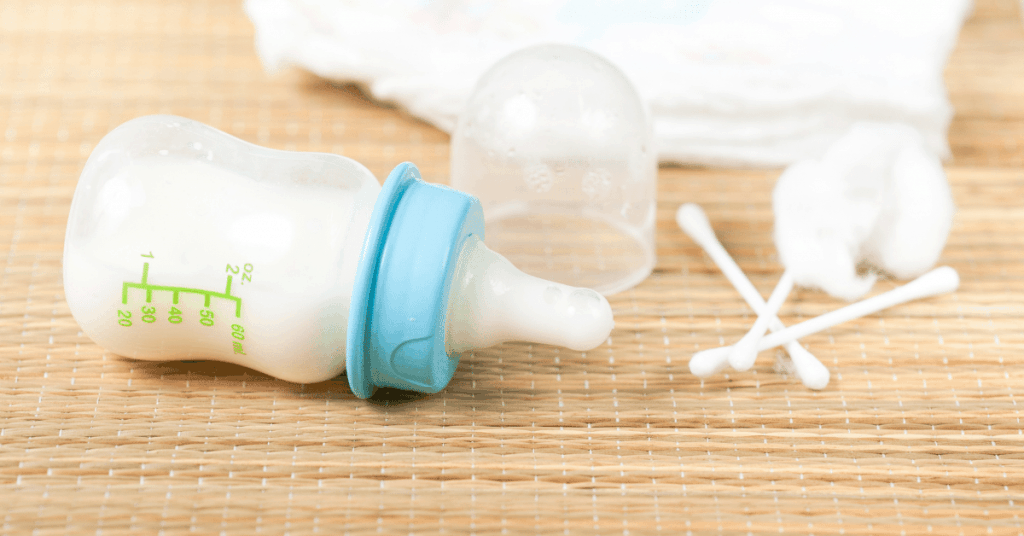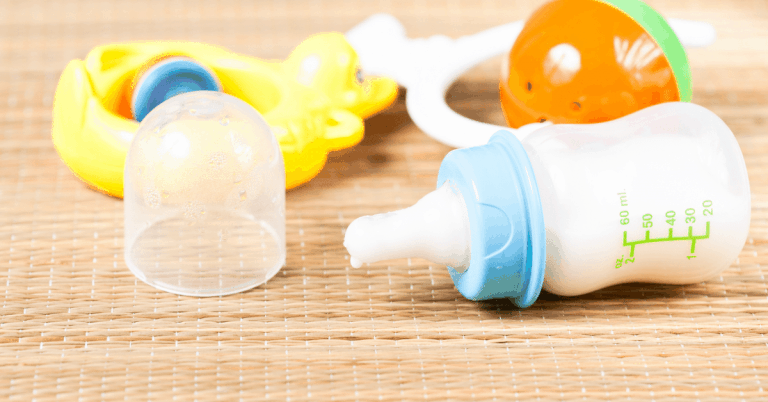Breastfeeding Information and Support
Items which are helpful to have when choosing to breastfeed include:
- Nursing Pillow & Cover (to raise baby to proper ergonomic position as you nurse)
- Nursing Pads (to absorb extra milk when you let down)
- Nipple Cream (to soften and soothe sore nipples)
- Milk Saver (collects milk for future use if you find yourself leaking a quantity of milk as you nurse)
- Milk Plus Tincture or Caps (herbal supplement to encourage milk production)
- Booby Tubes (cloth rolls that can be warmed or cooled to soothe sore breasts)
- Nursing Bra & Clothing that is “easy access”
Top Reasons to Breastfeed

Besides the close bonding that happens when a mother nurses her child there are many health benefits associated with breastfeeding. Remember our bodies are designed to feed and nourish our babies!
Breastfeeding Protects Against SIDS
Any breastfeeding was associated with an independent 45% reduction in risk of SIDS. Breastfeeding as the sole source of nutrition for any duration was associated with a 73% reduction in SIDS. Altogether, breastfeeding of any duration or level of exclusivity was associated with a 60% reduction in SIDS risk.
Breast-Feeding Mentally Bonds Mothers to Infants, Study Finds
Breast-feeding does more than nourish newborns. It may actually alter a woman’s brain to make her more sensitive to her baby’s cries.
Breast Milk Does A Body And Behavioral Development Good In Infants
Babies who are breastfed are less likely to grow into children with behavior problems by the time they reach the age of five than those who receive formula milk.
Breastfeeding by Diabetic Moms Cuts Babies’ Obesity Risk
Breastfeeding for six months or more may reduce the risk that babies born to diabetic mothers become obese later in life, a new study shows. Experts say breastfeeding also benefits moms by helping them recover from Gestational Diabetes.
Breastfeeding Linked to Fewer Seizures in Kids
Babies that are breastfed may have fewer seizures after they’re a year old, according to a recent study in Denmark.
Study Shows Breastfed Babies Grow Stronger Muscles
A team of researchers from the University of Granada have found that babies who were breastfed developed stronger leg muscles as adolescents than those who were not breastfed.
A Third of 9-Month-Olds Obese or at Risk of Obesity
Studies have found infants breastfed are much less likely to develop obesity as a child and later as an adult. Although it remains unknown what is responsible for the difference, researchers speculated at least some hormone present in mother’s breast milk protects against excessive weight gain.
Dutch Study Supports Policies That Promote Exclusive Breastfeeding
Infants in a Dutch study who were exclusively breastfed for at least six months were less likely to develop respiratory or gastrointestinal issues, which the researchers said supports “current health policy strategies that promote exclusive breastfeeding for six months in industrialized countries”.
Could Acid in Breast Milk be the Answer to Beating Cancer?
For the first time, the substance – known as Hamlet – has been successfully tested on humans. In the laboratory, the substance has been found to kill 40 types of cancer cells, with the advantage that it leaves healthy cells undamaged.
More Breast Feeding Could Save 900 Babies a Year
The lives of nearly 900 babies would be saved each year, along with billions of dollars, if 90 percent of U.S. women fed their babies breast milk only for the first six months of life, a cost analysis says.
Antidepressants May Delay Lactation
Early research suggests a link between antidepressant use and breastfeeding difficulties in new moms. The risk of delayed lactation after giving birth was twice as great among women in the study taking selective serotonin reuptake inhibitor (SSRI) antidepressants as among new mothers who did not take the drugs.
Maternal Benefits of Breast-Feeding: Less Risk of Vascular Disease
Women who had never breast-fed were more likely to have vascular changes associated with an increased risk of cardiovascular disease than those who had consistently breast-fed their children.
Magic Ingredient In Breast Milk Protects Babies’ Intestines
This study is important because it shows that a component of breast milk (PSTI) protects and repairs the babies delicate intestines in readiness for the onslaught of all the food and drink that are to come.
Does Breastfeeding Reduce the Risk of Sudden Infant Death Syndrome?
This study shows that breastfeeding reduced the risk of sudden infant death syndrome by 50% at all ages throughout infancy. We recommend including the advice to breastfeed through 6 months of age in sudden infant death syndrome risk-reduction messages.
Cancer Experts: Breastfeeding Protects Mothers, Children
Experts at the American Institute for Cancer Research (AICR) recommend that new mothers breastfeed their children for at least the first six months. They cite convincing evidence that this practice offers cancer protection to both mother and child.
Breastfeeding May Lower Allergy Risk
Exclusive breastfeeding for at least four months may help prevent asthma, eczema, and food allergies in high-risk babies.
Breastfeeding May Lower Babies’ Diabetes Risk
The analysis suggests as many as one in 20 cases of type 2 diabetes seen in industrialized nations could be attributable to formula feeding.
Breastfeeding Boosts Mental Health
A new study has found that babies that are breastfed for longer than six months have significantly better mental health in childhood.
Breastfeeding Could Help Break Cycle of Diabetes
A study being published in Diabetes Care provides families with one tool that may help: breastfeeding, according to the American Diabetes Association.
Breastfeeding can Benefit the Mental Development of Children Born Prematurely
The research from Brown Medical School in Providence, Rhode Island, USA, found that premature infants fed with breast milk in the hospital did better on tests of mental development later in life than others fed only formula.
Breastfeeding, Infant Formula Supplementation, and Autistic Disorder
The results of this preliminary study indicate that children who were not breastfed or were fed infant formula without docosahexaenoic acid/arachidonic acid supplementation were significantly more likely to have autistic disorder.
Breastfeeding During Infancy May Protect Against Bed-Wetting During Childhood
Babies who are breastfed for longer than three months are less likely to exhibit bed-wetting during childhood.
Hold Off on Solid Foods Until Breastfed Baby Is 6 Months
Researchers at the University of Rochester Medical Center have found another reason to keep those fancy baby spoons in the drawer until infants reach 6 months old. Babies who are breastfed – exclusively – for the first six months have fewer cases of pneumonia and ear infections than babies who were introduced to other foods between 4 and 6 months.
Breastfeeding and the Use of Human Milk
The American Academy of Pediatrics firmly adheres to the position that breastfeeding ensures the best possible health as well as the best developmental and psychosocial outcomes for the infant.
Breastfeeding May Protect Against Gluten Intolerance (Coeliac Disease)
Infants who were being regularly breastfed when they were first introduced to foods containing gluten cut their risk of developing coeliac disease by 52% compared with those who were not being breastfed.
Breastfeeding Linked to Reduced Risk of Childhood Leukemia
Babies who are breastfed have a lower risk of developing childhood leukemia, according to a new analysis of 14 studies by researchers at the University of California, Berkeley.
Association Between Breast Feeding and Asthma
A significant reduction in the risk of childhood asthma at age 6 years occurs if exclusive breast feeding is continued for at least the 4 months after birth.
Breastfeeding Resources/Support:

Academy of Breastfeeding Medicine
Dedicated to the promotion, protection and support of breastfeeding and human lactation.
International Lactation Consultant Association (ILCA)
A worldwide network of lactation professionals. Locate International Board Certified Lactation Consultants (IBCLCs) and other health care professionals who care for breastfeeding families in your area.
MOBI Motherhood International
MOBI stands for Mothers Overcoming Breastfeeding Issues. It is a non-profit organization committed to research, advocacy, education, and support for mothers with extraordinary circumstances that hinder or prevent the breastfeeding relationship.
La Leche League International
Helping mothers worldwide to breastfeed through mother-to-mother support, encouragement, information and education, and to promote a better understanding of breastfeeding as an important element in the healthy development of the baby and the mother.
National Alliance for Breastfeeding Advocacy (NABA)
Dedicated to the protection, promotion and support of breastfeeding.
National Milk Bank
A nationwide organization that collects donated human milk, ensures milk safety and quality and makes it available for infants in need.
United States Lactation Consultants Association (USLCA)
A national association that advocates for lactation professionals.
Women, Infants and Children (WIC)
The Special Supplemental Nutrition Program for Women, Infants, and Children – better known as the WIC Program.
World Alliance for Breastfeeding Action (WABA)
Protects, promotes and supports breastfeeding worldwide.
Breastfeeding.com
The one place for new moms & expectant mothers.
Breastfeeding Guide
La Leche League’s online magazine with breastfeeding tips.
Dr. Jay Gordon
Intensely interested in infant nutrition and breastfeeding, Dr. Gordon is the first male physician to sit for and pass the International Board of Lactation Certification Exam. He has served on the Professional Advisory Board of La Leche League for twenty years.
Drugs in Pregnancy and Breastfeeding – SafeFetus.com
A complete database of worldwide medications (generic & trade) providing information on the drugs’ indications, fetal risk, breastfeeding risk, during pregnancy, according to the FDA.
Kellymom
This website was developed to provide evidence-based information on breastfeeding, sleep and parenting.
Lactivist (lactation activist)
A warehouse of breastfeeding information.
Low Milk Supply
Provides information and support to mothers who are experiencing low milk production. It is also an online resource for healthcare providers who help mothers breastfeed.
Mothering – Natural Family Living
Mothering’s collection of articles and information about pregnancy & birth.
Natural vs. Organic
Learn about the USDA certified organic label and read on for more about the difference between organic, natural and conventional products.
Wise Woman Herbal for the Childbearing Year
Ms. Weed’s personal interest in herbal medicine came about because of her own pregnancy and her desire to find drug-free ways of helping herself deal with problems. She has helped three generations of women conceive, carry and give birth naturally.
Women’s Health Issues
Provides special information dedicated for women on women’s health issues. Here you will find everything you want to know and more.

Breastmilk Storage Guidelines (for healthy babies)
| Location | Temperature | Duration healthy for Freshly Expressed Breastmilk | Duration healthy for Thawed Breastmilk/ Previously Frozen | Comment |
| Countertop, Table, etc | Room temperature (up to 77 ºF or 25º C) | 6-8 hours | Do not store | Containers should be covered and kept as cool as possible; covering the container with a cool towel may keep milk cooler. |
| Insulated Cooler Bag | 5-39 ºF – 15-4 ºC | 24 hours | Do not store | Keep ice packs in contact with milk containers at all times, limit opening of cooler bag. |
| Refrigerator | 39 ºF 4 ºC | 5-7 days* | 24 hours ** | Store milk in the back of the main body of the refrigerator. |
| Freezer (Self contained frig freezer unit) | 0 ºF -18 ºC | 3-6 months | Do not refreeze thawed milk | Store milk toward the back of the freezer, where temperature is most constant. Milk stored for longer durations in the ranges listed is safe, but some of the lipids in the milk undergo degradation, resulting in lower quality. |
| Deep Freezer | -4 ºF -20 ºC | 6-12 months | Do not refreeze thawed milk |








